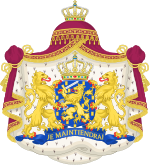Prince Frederick of the Netherlands
 | |||||||||||||||||
|
Prince Frederik of the Netherlands (full names: Willem Frederik Karel), Prince of the Netherlands, Prince of Luxembourg, Prince of Orange-Nassau (Berlin, 28 February, 1797 – Pauw Haus, Wassenaar, 8 September, 1881), was the second son of king William I of the Netherlands and his wife Queen Wilhelmine.
Early life
The prince grew up at the court of his grandfather Frederick William II of Prussia and uncle Frederick William III of Prussia. One of his tutors was Karl von Clausewitz. Aged 16, the prince fought in the battle of Leipzig.
The prince first entered the Netherlands in December 1813. As he spoke no Dutch, the prince was sent to Leiden University to get a further education. He was also educated by Karl Ludwig von Phull in The Hague. When Napoleon returned from Elba, during the Hundred Days the prince was given command of a detachment of Wellington's army which was posted in a fall back position near Braine should the battle taking place at Waterloo be lost.
Prince of the Netherlands
Based on a house treaty, the prince would inhereit the family's German possessions upon his father's death. As these were no longer in the possession of the family, this would be exchanged for the grand duchy of Luxemburg. In 1816, Frederik relinquished this claim for land in the Netherlands and for the tile of Prince of the Netherlands.
In 1826 Frederik was appointed commissary-general of the department of war. In this function Frederik reorganized the army on a Prussian model. Frederik founded the military academy in Breda and reequipped the army with modern weaponry.
In 1829 Frederik was a candidate for the Greek throne but he declined because he did not want to be king of a country whose language and traditions were foreign to him.
During the Belgian Revolution of 1830, Frederik commanded the troops send to Brussels to suppress the rebellion. After the independence of Belgium he took part in the Ten days campaign of 1831.
When his father abdicated in 1840, Frederik retreated from public life to his estates at Wassenaar but upon the death of his elder brother in 1849, the new King William III of the Netherlands recalled him to public life and in 1849 made him Inspector-General of the army, a function he held until 1868 when he resigned because of the lack of support for his modernization plans of the army.
Marriage
Prince Frederik married in Berlin on 21 May, 1825 his first cousin Louise, daughter of Frederick William III of Prussia. They had four children:
- Wilhelmina Frederika Alexandrine Anna Louise (1828-1871), married to Charles XV of Sweden
- Willem Frederik Nicolaas Karel (The Hague, 6 July 1833 - The Hague, 1 November 1834)
- Willem Frederik Nicolaas Albert (The Hague, 22 August 1836 - The Hague, 23 January 1846)
- Wilhelmina Frederika Alexandrine Anna Louise Marie (Pauw Haus, Wassenaar, 5 July 1841 - Neuwied, 22 June 1910), married in Wassenaar on 18 July 1871 Wilhelm 5te Fürst zu Wied (Neuwied, 22 August 1845 - Neuwied, 22 October 1907). They were parents of William, Prince of Albania.

